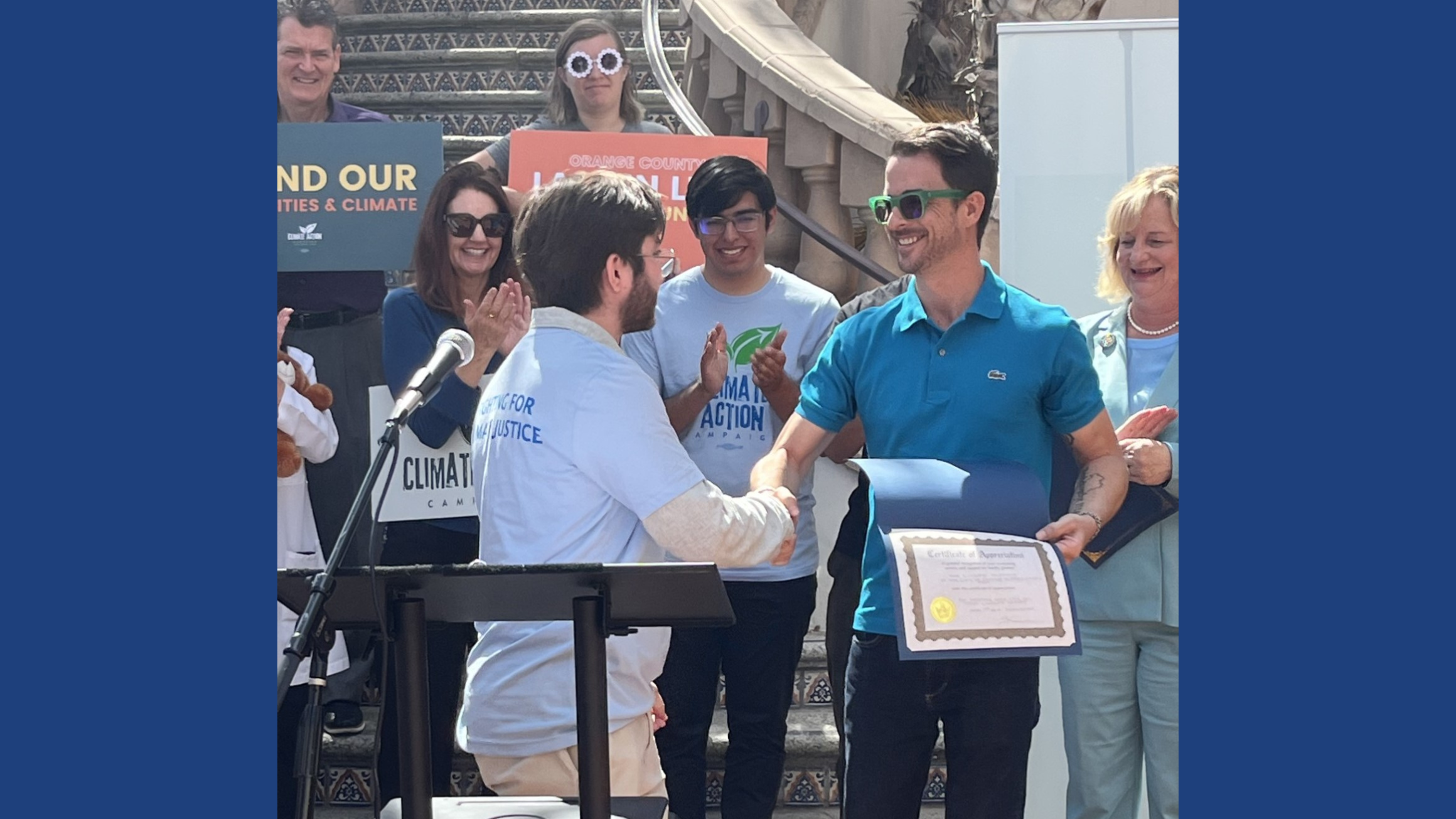Penn State’s Local Climate Action Program (LCAP) is making a valuable impact beyond Pennsylvania’s borders, thanks in part to recent Penn State World Campus energy and sustainability policy graduate Joe Thompson.
Thompson, a northern California native now living in Orange County, was part of the first LCAP cohort facilitated by Penn State, from August 2022 through May 2023. During that time, he worked on creating a climate action plan for Doylestown, Pennsylvania. This fall, he was honored at a ceremony hosted by the San Diego chapter of the Climate Action Campaign (CAC), a nonprofit that advocates for creating and adopting climate action plans (CAPs).
“To be honored reinforced my belief and contribution to local climate work,” Thompson said. “It also set an example for the rest of Orange County that this work doesn’t require a huge budget and new hires — residents are equally equipped and ready to act. So, let’s use them!”
The LCAP partners upper-level Penn State students with Pennsylvania’s local governments to determine a community’s contribution to climate change and help that government develop plans to draw down carbon emissions and adapt to a changing climate. Created by the Pennsylvania Department of Environmental Protection in 2019, the LCAP was turned over to Penn State in 2022.
Thompson is a lead interconnection coordinator at Sunnova Energy, where he oversees a team managing interconnections of residential solar and battery storage projects. Both his day job and his work as a volunteer consultant with the City of Orange Sustainability Committee allow him to draw on his passion for sustainability. He credits much of his success in both endeavors to the skills and confidence he built in the LCAP.
“My experience in LCAP helped me develop more effective communication skills and manage learning with complex deliverables,” he said. “In my current job, this helped me transform a pipeline that had been at a standstill with implementing new processes and updating team engagement strategies.”
While support for climate action is widespread, climate action planning is nevertheless a potentially contentious issue because it requires consensus-building among diverse stakeholders at the local level, said Thompson. In this regard, Thompson’s LCAP experience helped to guide his fellow Orange Sustainability Committee members' approach.
“LCAP begins by having students write about a place they love,” said Peter Buck, Penn State Sustainability’s director for education and co-director of the LCAP. “Starting from this common ground helps to build relationships with community partners. From there, it’s easier to understand and accept how our communities drive climate change and what we can do about it. It’s about a team. It’s about us.”
Thompson and fellow members of the Orange Sustainability Committee worked with 17 environmental science and policy majors at Chapman University in Orange as part of their capstone project. After getting the go-ahead in December of 2023, Thompson spoke to the students about conducting a greenhouse gas (GHG) inventory in January of 2024. He showed them the ICLEI ClearPath software used to conduct his GHG inventory and the resulting report created during his time in the LCAP. Brandi Robinson, LCAP co-director and associate teaching professor in the John and Willie Leone Family Department of Energy and Mineral Engineering, connected him to a similar and cost-free EPA-produced Excel tool to inventory the city’s greenhouse gases. Robinson’s former colleague, Andrea Denny, helped produce the tool and assisted as needed. Thompson then returned to the class and consulted with them.
Thompson first advised the students in conducting the GHG emissions inventory. They gathered and calculated emissions from energy, transportation, wastewater, and other sectors. He also helped them identify where gaps existed in available data, how to form correct assumptions for the gaps, and where to locate accurate local data.
Attention then turned toward policy. Thompson helped the students effectively reflect on what they had learned, guided them on how to keep implementation cost-appropriate, and helped them look at funding options so the city would know it wouldn’t be responsible for unfeasible upfront costs. He also helped to edit the overall document they created, ensuring that the policies recommended were digestible, affordable, and actionable.
“Through LCAP stakeholder engagement, I learned how to communicate climate science and climate action planning verbally, visually, and in writing to various strata of the Doylestown community, which was key to my consulting experience,” Thompson explained. “Working with students, residents, and city council members required different approaches, each with a unique mindset based on finding common ground to improve the quality of life for all residents and ensure our community is resilient to the changing climate.”
In May 2024, the group presented their findings and a recommended climate action plan to City of Orange officials, who were very excited upon seeing the students’ presentations — especially upon realizing that the creation of the plan was free and that it made use of community-level resources. The plan is now in the funding stage, and the Sustainability Committee is helping the city find ways to pay for recommended adaptations.
“Seeing the students present their GHG inventory and plan to an enthusiastic city council was incredible,” Thompson said. “It revealed the power of community-based action and agency. We all were inspired, but we also were motivated to do something that reaches far beyond ourselves.”
While climate preparedness is the focus of the LCAP, the value students gain from participating in the program has far-reaching implications.
“Helping students understand their role as citizens of the U.S. is integral to democracy,” said Buck, who has served as an elected and appointed official in local and regional government for the last 10 years. “Joe is embodying LCAP learning outcomes. And he’s not alone in having done this.”
“It is so rewarding to feel equipped,” Thompson said. “I greatly thank Brandi and Peter because they gave us the knowledge and confidence and a broad enough sense of the overall climate action planning process so that I was able to guide a class in how to do this. The LCAP is very inspiring. It aligns with morals and has the power to transform you. It gives me chills. I didn’t know I wanted this role — but I’m excited to be evolving into this new phase of my personal and professional self.”
Learn more about the Bachelor of Science in Energy and Sustainability and the opportunities available to students online through Penn State World Campus.


